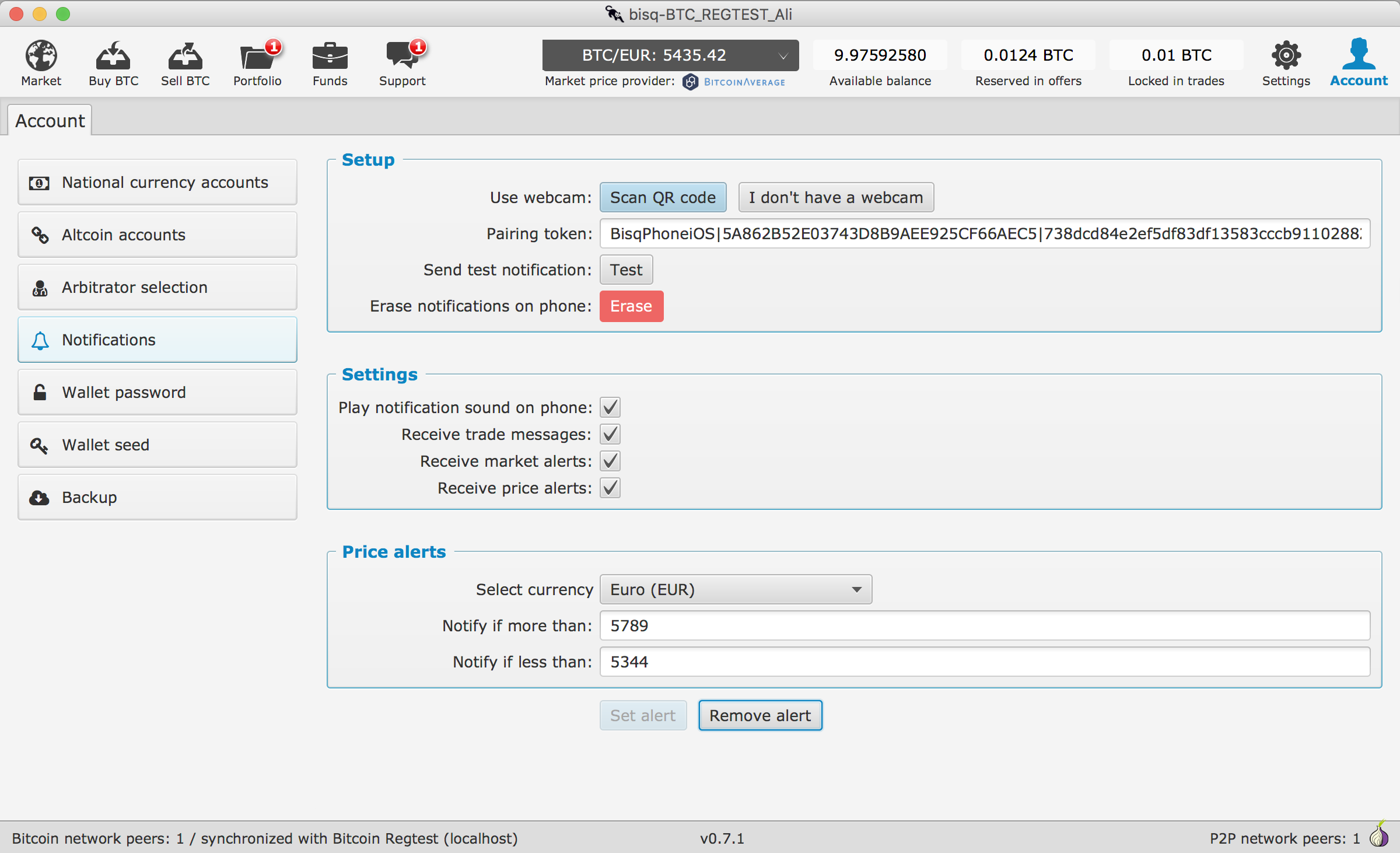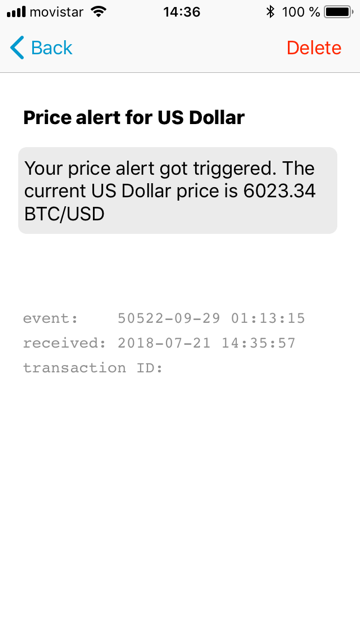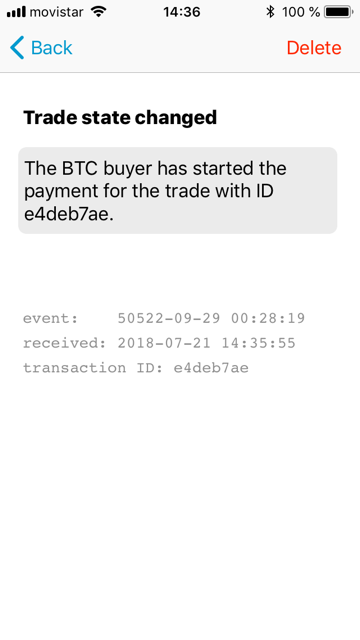-
Notifications
You must be signed in to change notification settings - Fork 10
New issue
Have a question about this project? Sign up for a free GitHub account to open an issue and contact its maintainers and the community.
By clicking “Sign up for GitHub”, you agree to our terms of service and privacy statement. We’ll occasionally send you account related emails.
Already on GitHub? Sign in to your account
Bisq remote #25
Comments
|
Thanks @joachimneumann for the proposal! I think the notification server should be a Bisq node with both the P2P network layer as a normal Bisq node and a HTTP server interface as the price node. I am working atm on integration for the APIs and we planned to support a HTTP API and a gRPC API. I think it would make sense to add another API layer which is Tor hidden service based only for supporting the communication between the notification node and the Bisq App. |
|
I would propose that I start out with a very lean Bisq notification node. Later, we can decide between
I think that Option 1 makes more sense, because
|
|
For bidirectional mobile app - Bisq Desktop the server model used in the price node is not sufficient as the server cannot contact the Bisq Desktop. For that a P2P node would be required. It would combine a Bisq node like the Seed node or monitor node with the HTTP server functionality of the price node. |
|
@ManfredKarrer You are right, we need a P2P Bisq notification node not a Bisq notification Server. I will update the spec accordingly. I also update my previous comment in which I argue for lean mobile remote functionality. |
|
Just an update from our last discussion: In the version 2 with bidirectional messaging between Bisq and mobile we should try first to get Tor hidden services support for mobile. On Android it should be not a big issue (Bernhard did that 2-3 years ago). For iOS we need to check out if there is a native Tor app (there is no official Tor browser). It seems that on iOS you cannot create a sub process which makes the model we use in Bisq impossible (start native Tor and communicate over TCP). So it might be that the challenge to get Tor working on iOS will be too hard. Then we have to decide if we support Android only, or if we use the above discussed solution to communicate over a proxy node which has a Tor API between Bisq and the node and a http API to the mobile. |
|
It's the unavailability of a Tor implementation on iOS that makes me wonder why not start with Android here? Would be a shame to have to switch platforms just when things are getting going. And a working Android app would set a clear mark for what needs to be possible on iOS, making it all the easier for someone to step up and fill exactly that gap. |
|
Exciting stuff, @joachimneumann. I've read through the proposal and all comments and have reacted 👍. In my experience, it's a good idea to start thinking and talking about compensation and inclusion in the @bisq-network GitHub organization fairly early in the process. I'll put a few "menu items" on the table you can choose from:
We don't have strong best practices yet as to how to manage this kind of process. Maybe you see other options than the three listed above, feel free to share ideas. What we do know so far is that when somebody is building a brand-new component for Bisq, we want the burden and risk to be on them to propose the project well (as you have done here, thanks), and then to execute the project in a way that makes it obvious to everyone that valuable work has been produced. I recommend reading through this recent proposal in which we agreed that contributors will request compensation only for delivered work. No need to make hard decisions on any of this just now, but I do recommend thinking on it and updating your proposal to indicate which approach you plan to take (even if you change it later), and to lay out some specific criteria for what a "delivered" Bisq Remote app will look like. |
|
Chris and Manfred, you are both technically right of course. However, I happen mainly to be an iOS developer and therefore feel more comfortable to iterate on the design of the mobile app and the architecture (without tor) in iOS. I also think that the iOS app would still be useful for less privacy-concerned users that want to get push notifications without making sure that the app always runs in background in their phone. I fear that a Tor-based solution — both on Android and on iOS — would not be able to offer push notifications, which reduces the usability. Ideally I would like offer the user a choice between good usability (push) and privacy (pull, tor), but I need to start somewhere and the Tor-based solution might later be nicely motivated by a working, but imperfect iOS app. |
|
I would see for the version 1 (notification only) both platforms iOS and Android supported. Version 2 with more features and bidirectional communication could still have all version 1 features but adds the tor implementation. That depends then if it is feasible to implement on iOS if we can deliver if for both platforms, otherwise a Android only version 2 app might be a way to go. Alternatively we could try the approach with the proxy server which acts as gateway between the iOS app and the Bisq app. |
|
I would like to just maker here a quick note what is needed beside the iOS app:
Beside that an Android app would be good to have as well. If any dev has time and skills to work on that would be great! Experience with UI work in JavaFx is required for that task as most effort will be on the UI side. |
|
Here is an update of the development of the notification app
|
|
Closing as approved. Development has been underway for a quite a while now, and Development updates like those above should probably happen somewhere other than than the proposal itself. I'll leave it to the developers (@joachimneumann, @ManfredKarrer) to share where they'd like people to follow updates from here out. Note that I created a |









Bisq Remote
Introduction
Bisq users with an open trade need to keep Bisq running on their computer, but might be afk.
This Bisq proposal aims at providing a iOS and Android App that can receive notifications from the Bisq desktop app. The mobile Apps are not designed to ever evolve into a full Bisq node, but should rather serve as a remote control to the user's one Bisq node, which runs on his own computer.
Specification
moved here
The text was updated successfully, but these errors were encountered: